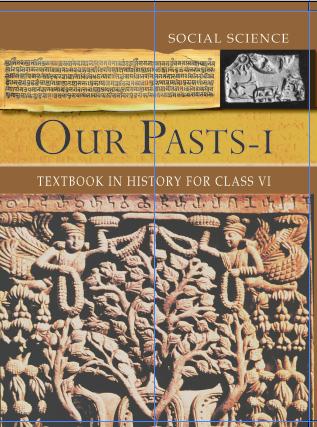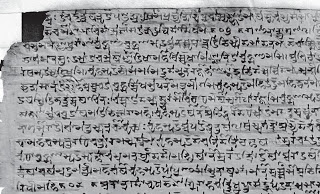NCERT Solutions for Class 6 Social Science History What books and burials tell us book solutions are available in PDF format for free download. These ncert book chapter wise questions and answers are very helpful for CBSE exam. CBSE recommends NCERT books and most of the questions in CBSE exam are asked from NCERT textbooks. Class 6 Social Science chapter wise NCERT solution for Social Science part 1 part 2 and Part 3 for all the chapters can be downloaded from our website and myCBSEguide mobile app for free.
NCERT solutions for History Download as PDF

NCERT Class 6 Social Science Chapter Wise Solutions
History – Our Pasts Part I
- Chapter 1 – What, Where, How and when?
- Chapter 2 – On The Trial of the Earliest People
- Chapter 3 – From Gathering to Growing Food
- Chapter 4 – In the Earliest Cities
- Chapter 5 – What Books and Burials Tell Us
- Chapter 6 – Kingdoms, Kings and an Early Republic
- Chapter 7 – New Questions and Ideas
- Chapter 8 – Ashoka, The Emperor Who gave Up War
- Chapter 9 – Vital, Villages and Pilgrims
- Chapter 10 – Traders, Kings and Pilgrims
- Chapter 11 – New Empires and Kingdoms
- Chapter 12 – Bulidings, Paintings and Books
Geography – The Earth Our Habitat Part I
- Chapter 1 – The Earth in the Solar System
- Chapter 2 – Globe: Latitudes and Longitudes
- Chapter 3 – Motions of the Earth
- Chapter 4 – Maps
- Chapter 5 – Major Landforms of the Earth
- Chapter 6 – Major Domains of the Earth
- Chapter 7 – Our Country – India
- Chapter 8 – India: Climate, Vegetation and Wildlife
Political Science
- Chapter 1 – Understanding Diversity
- Chapter 2 – Diversity and Discrimination
- Chapter 3 – What is Government
- Chapter 4 – Key Elements of a Democratic Government
- Chapter 5 – Panchayati Raj
- Chapter 6 – Rural Administration
NCERT solutions for Class 6 Social Science History What books and burials tell us
1. Match the columns
| Sukta | Stone-boulder |
| Chariots | Sacrifice |
| Yajna | Well-said |
| Dasa | Used in battles |
| Megalith | Slave |
Answer.
Sukta – Well-said
Chariots – Used in battles
Yajna – Sacrifice
Dasa – Slave
Megalith – Stone-boulder
2.Complete the sentences:
(a) Slaves were used for
Answer: various kinds of work.
(b) Megaliths are found in
Answer: (b) throughout the Deccan ,south India, in the north- east and Kashmir.
(c) Stone circles or boulders on the surface were used to —
Answer: (c) cover and indicate the burial places.
(d) Port-holes were used for ——
Answer: (d) Port-holes were the openings for entering the burial places.
(e) People at Inamgaon ate ———
Answer: (e) Fruits (ber, amla, jamun, dates and a variety of berries), cereals (seeds of wheat, barley, rice, pulses, millets, peas and sesame) and meat.
Question 3. In what ways are the books we read today different from the Rigveda?
Answer. The books we use today are written, printed and then read, whereas Rigveda is the oldest of all Vedas and is supposed to have been composed about 3,500 years ago. It was recited and heard and passed on from one generation to another. It was written down several centuries after it was first composed and printed less than 200 years ago. It provides most of the information regarding the early Vedic period.

Question 4. What kind of evidence from burials do archaeologists use to find out whether there were social differences amongst those who were buried?
Answer. Archaeologists have found burial places which help them to reconstruct the past and tell about the society. At Brahmagiri, the archaeologists have found out a skeleton buried with 33 gold beads, 2 stone beads, 4 copper bangles and one conch shell. Some skeletons were buried with more pots while, other skeletons have only a few pots. These findings suggest that there was some difference in status amongst the people who were buried.
Question 5. In what ways do you think that the life of a raja was different from that of a dasa or dasi?
Answer. The words like’ raja’,’dasa’ and ‘dasi’ are used to describe the people found in the Rig Veda.The raja is the elected ruler of a tribe called jana. He did not have capitals, palaces or armies, nor did he collect taxes. Generally, the sons did not automatically succeed fathers as rajas. They managed with voluntary contributions (bali) made by the members of the tribe. The raja took decision with the consent of sabha and samiti, which were tribal assemblies.There were people who did not perform sacrifices and probably spoke different languages. Later, the term came to mean dasa (and the feminine dasi) or slave. Slaves were men and women captured in the war. They were treated as the property of the owners who could make them do any kind of work they wanted.
Question 6. Find out whether your school library has a collection of books on religion, and list the names of five books from this collection.
Answer. Refer your school library. Following are few important books on religion:
| BOOKS | RELIGION |
| 1. Guru Granth Sahib | Sikh |
| 2. Zend Avesta | Zoroastrianism |
| 3. Quran | Islam |
| 4. Bible | Christianity |
| 5. Old testament | Judaism |
|
Hinduism |
Question 7. Write down a short poem or song that you have memorized. Did you hear or read the poem or song? How did you learn it by heart?
Answer: (Do it yourself. Refer to an example) A Song which we have memorized is a song from film Jagriti (1954), sung and written by the legendary poet and singer kavi .We heard and saw this song in film Jagriti, 2-3 times on TV. Also during Independence Day and Republic Day celebrations, this song is very often broadcasted by All India Radio and even telecasted by Door Darshan on TV.
Question 8. In the Rigveda, people were described in terms of the work they did and the languages they spoke. In the table below, fill in the names of six people you know, choosing three men and three women. For each of them, mention the work they do and the language they speak. Would you like to add anything else to the description?
Answer. In the Rig-Veda, people were described in term of the work they did and the language they spoke. In the table below, given the names of six people we know, three men and three women. For each of them, mentioned the work they do and the language they speak.
| Name | Work | Language | Anything else |
| 1. Teacher in my school (Female) | Teaching | English and Hindi | Sometimes they act the scene with the help of the children. |
| 2. Doctors (Male) | Gives medical treatment | Generally Hindi sometimes | Examines the body parts, gives medicine and sometimes a dose of injection |
| 3. Vegetables Sellers (Male) | Sells vegetables | Hindi | Use haggling and tries to give less weight |
| 4. Maid-Servant (Female) | Does Households work | Hindi | Sometimes cooks food and very often take leave |
| 5. Driver (Male) | Drive our cars | Hindi | Drop us to school, takes us to any other place |
| 6. Salesgirl in the Shop (Female) | Display the goods in the shops and show them to customers | English and Hindi | Gossip a lot, tries to sell the goods as quickly as possible |
NCERT solutions for Class 6 Social Science
NCERT Solutions Class 6 Social Science PDF (Download) Free from myCBSEguide app and myCBSEguide website. Ncert solution class 6 Social Science includes textbook solutions from part 1 and part 2 and part 3 NCERT Solutions for CBSE Class 6 Social Science have total 29 chapters. 6 Social Science NCERT Solutions in PDF for free Download on our website. Ncert Social Science class 6 solutions PDF and Social Science ncert class 6 PDF solutions with latest modifications and as per the latest CBSE syllabus are only available in myCBSEguide.
CBSE app for Class 6
To download NCERT Solutions for class 6 Social Science, Computer Science, Hindi, English, Maths Science do check myCBSEguide app or website. myCBSEguide provides sample papers with solution, test papers for chapter-wise practice, NCERT solutions, NCERT Exemplar solutions, quick revision notes for ready reference, CBSE guess papers and CBSE important question papers. Sample Paper all are made available through the best app for CBSE students and myCBSEguide website.

Test Generator
Create question paper PDF and online tests with your own name & logo in minutes.
Create Now
Learn8 App
Practice unlimited questions for Entrance tests & government job exams at ₹99 only
Install Now